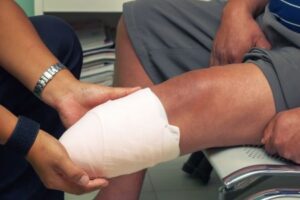Types of Permanent Disabilities

Which would you rather have: excellent health or $1 million? Many people would gladly take the money, but you can’t put a price on your health. More than 70 million adults in the United States suffer from some sort of disability. What they wouldn’t give to be perfectly mobile and healthy again so they can work and enjoy their lives without assistance.
A disease or injury can leave a person with temporary or permanent disabilities. As the name implies, permanent disabilities are expected to last the rest of a person’s life. They are conditions that significantly limit an individual’s ability to perform one or more major life activities. A temporary disability, on the other hand, is not lifelong or even long-term. A person will suffer a disability for days, weeks, or months, but eventually recover.
The Social Security Administration (SSA) keeps a list of disabilities that qualify a person for disability benefits. The SSA is very strict when it comes to approving applications, so as you can imagine, the disabilities on the list are very severe and are expected to last longer than one year or be terminal in nature.
Examples of Permanent Disabilities
- Amputation. This refers to a loss of one or more limbs.
- Paralysis. This refers to quadriplegia or paraplegia resulting from spinal cord injuries.
- Cerebral palsy. This is a group of disorders affecting movement, muscle tone, or posture.
- Multiple sclerosis. This is a progressive disease affecting the central nervous system.
- Muscular dystrophy. This is a group of genetic disorders causing muscle weakness and degeneration.
- This includes severe forms like rheumatoid arthritis that limit mobility permanently.
- Chronic pain disorders. An example is Complex Regional Pain Syndrome (CRPS).
- Any significant vision impairment is considered a disability.
- Severe or total hearing loss is considered a disability.
- Traumatic brain injury (TBI). This is severe brain trauma that results in lasting cognitive, physical, or emotional impairments.
- Epilepsy. Seizures can significantly impair daily activities despite treatment.
- Stroke survivors. A stroke can result in permanent impairments such as partial paralysis or speech difficulties.
- Parkinson’s disease. This is a progressive neurological condition affecting motor skills.
- Intellectual disabilities. These can cause impairments in cognitive functioning and adaptive behavior.
- Diabetes-related complications. These can lead to permanent damage such as amputations and blindness.
- Those who have cancer may be terminal. Those who survive can suffer lasting impairments or disabilities due to treatment.
- Kidney failure. Severe kidney diseases may require lifelong dialysis or a transplant.
Contact a New Jersey Personal Injury Lawyer Today
A catastrophic injury can become a temporary or permanent disability, affecting your life in many ways. You could experience loss of income, medical expenses for treatment and rehabilitation, and a loss of ability to enjoy your life.
The goal of any personal injury lawsuit is to recover compensation for exactly these kinds of damages, however it is highly recommended that you work with a Morristown catastrophic injury attorney from The Law Offices of Michael P. Burakoff. We will make sure you recover compensation that accurately meets your financial damages. Call (973) 455-1567 or fill out the online form to schedule a consultation.
Source:
ssa.gov/disability/professionals/bluebook/AdultListings.htm
